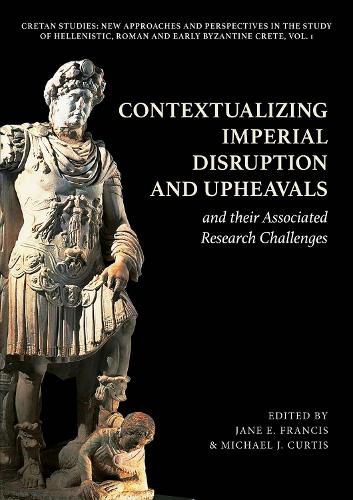Readings Newsletter
Become a Readings Member to make your shopping experience even easier.
Sign in or sign up for free!
You’re not far away from qualifying for FREE standard shipping within Australia
You’ve qualified for FREE standard shipping within Australia
The cart is loading…






This volume follows on from papers presented at the 13th International Cretan Congress in 2022 and covers the period from the 1st century BC to 4th?5th centuries AD, with the articles in the volume set around the topic of upheavals and disruptions, and in particular those evidenced with the arrival of Rome, the creation of the Roman Province, along with those resulting from the dividing of the Roman Empire and the emergence of the Byzantine world. The volume is set against the background of the Roman conquest of Crete in 67 BC, which heralded the end of the power and control of the Greek city-states, which were themselves steeped in age-old traditions and governed by a variety of legal frameworks, some of which had their roots in Archaic times. The ensuing changes, when they arrived, took centuries to develop but resulted in the establishment of a Greco-Roman culture and society that was far removed from its Hellenistic predecessor. Roman Crete witnessed several significant periods of disruption and interventions that had a direct impact on daily life and society. These included the military invasion of the island by Rome, at one end of the period, and the AD 365 destructive earthquake at the other, but other interruptions also occurred: changes to religion and religious practices, including the introduction of Christianity; fluctuations in natural resources that affected agricultural production and thus local economies and trade; monetary devaluations in Rome; movements of populations; external shifts in trading networks; and multiple instances of tectonic activity in the Imperial period that caused damage and instability. AUTHORS: Jane E. Francis is a professor of Classical Archaeology at Concordia University in Montreal. She completed her PhD at Bryn Mawr College. Her main research interests focus on the material evidence of the Roman period on Crete, especially pottery and beekeeping. She has studied and published pottery from excavations and surveys on Crete, including Sphakia, Skoteino Cave, and Khavania. Michael J. Curtis is an Honorary Fellow and Doctoral Researcher at the School of Archaeology and Ancient History at the University of Leicester, where his research interests are centred on the development and infrastructure of the Cretan maritime landscape through the Hellenistic and Roman periods, a topic that is reflected in his fieldwork on the island, published articles and presentations. Michael is the Course Director and joint founder of My Ancient World Learning Ltd, a company that specialises in the delivery of Lifelong Learning modules in Archaeology, Ancient History and Classics to global audiences. 150 b/w illustrations
$9.00 standard shipping within Australia
FREE standard shipping within Australia for orders over $100.00
Express & International shipping calculated at checkout
This volume follows on from papers presented at the 13th International Cretan Congress in 2022 and covers the period from the 1st century BC to 4th?5th centuries AD, with the articles in the volume set around the topic of upheavals and disruptions, and in particular those evidenced with the arrival of Rome, the creation of the Roman Province, along with those resulting from the dividing of the Roman Empire and the emergence of the Byzantine world. The volume is set against the background of the Roman conquest of Crete in 67 BC, which heralded the end of the power and control of the Greek city-states, which were themselves steeped in age-old traditions and governed by a variety of legal frameworks, some of which had their roots in Archaic times. The ensuing changes, when they arrived, took centuries to develop but resulted in the establishment of a Greco-Roman culture and society that was far removed from its Hellenistic predecessor. Roman Crete witnessed several significant periods of disruption and interventions that had a direct impact on daily life and society. These included the military invasion of the island by Rome, at one end of the period, and the AD 365 destructive earthquake at the other, but other interruptions also occurred: changes to religion and religious practices, including the introduction of Christianity; fluctuations in natural resources that affected agricultural production and thus local economies and trade; monetary devaluations in Rome; movements of populations; external shifts in trading networks; and multiple instances of tectonic activity in the Imperial period that caused damage and instability. AUTHORS: Jane E. Francis is a professor of Classical Archaeology at Concordia University in Montreal. She completed her PhD at Bryn Mawr College. Her main research interests focus on the material evidence of the Roman period on Crete, especially pottery and beekeeping. She has studied and published pottery from excavations and surveys on Crete, including Sphakia, Skoteino Cave, and Khavania. Michael J. Curtis is an Honorary Fellow and Doctoral Researcher at the School of Archaeology and Ancient History at the University of Leicester, where his research interests are centred on the development and infrastructure of the Cretan maritime landscape through the Hellenistic and Roman periods, a topic that is reflected in his fieldwork on the island, published articles and presentations. Michael is the Course Director and joint founder of My Ancient World Learning Ltd, a company that specialises in the delivery of Lifelong Learning modules in Archaeology, Ancient History and Classics to global audiences. 150 b/w illustrations